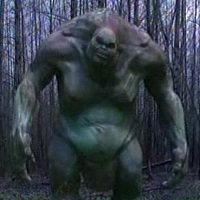
Ogre(s)
CBUB Wins: 0
CBUB Losses: 0
CBUB Ties: 0
Win Percentage: 0%
Added by: Boratz
Read more about Ogre(s) at: Wikipedia
Official Site: Public Domains
Ogres (feminine singular: ogress, plural: ogresses) are legend beings which are usually depicted as large, hideous, humanoid monster. They are frequently featured in mythology, folklore, and fiction throughout the world. Ogres appear in many classic works of literature, and are most often described in fairy tales and folklore as feeding on human beings. In visual art, ogres are often depicted as having a large head, abundant hair and beard, a voracious appetite, and a strong body.
The word ogre is of French origin. Its earliest attestation is in Chrétien de Troyes' late 12th century verse romance Perceval, li contes del graal, which contains the lines:
"And it is written that he will come again to all the realms of Logres, known as the land of ogres, and destroy them with that lance." The ogres in this rhyme may refer to the ogres who, in the pseudohistorical work History of the Kings of Britain by Geoffrey of Monmouth, were the inhabitants of Britain prior to human settlement. It is surmised that these descriptions of both trolls and ogres may have been based on the past existence of Neanderthals, who also lived in caves and practised cannibalism. Ogre could possibly derive from the two mythical giants Gog and Magog (or from the Greek river god Oiagros, father of Orpheus).
The word ogre came into wider usage in the works of Charles Perrault (1628–1703) or Marie-Catherine Jumelle de Berneville, Comtesse d' Aulnoy (1650–1705), both of whom were French authors. Other sources say that the name is derived from the word Hongrois, which means Hungarian, as of western cultures referred to Hungarians as a kind of monstrosity. The word ogre is thought to have been popularized by the works of Italian author Giambattista Basile (1575–1632), who used the Neapolitan word uerco, or in standard Italian, orco. This word is documented in earlier Italian works (Fazio degli Uberti, XIV cent.; Luigi Pulci, XV; Ludovico Ariosto, XV-XVI) and has even older cognates with the Latin orcus and the Old English orcnēas found in Beowulf lines 112-113, which inspired J.R.R. Tolkien's Orc. All these words may derive from a shared Indo-European mythological concept (as Tolkien himself speculated, as cited by Tom Shippey, The Road to Middle-earth, 45). Some see the French myth of the ogre as being inspired by the real-life crimes of Gilles de Rais.
CBUB Match Record:
No Regular Play Records Available
No Fantasy Draft Records Available
